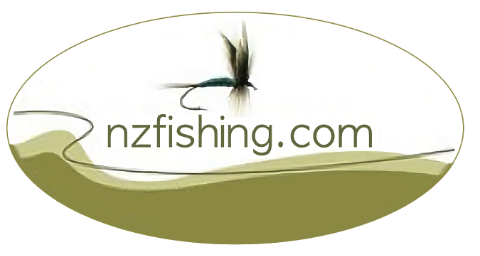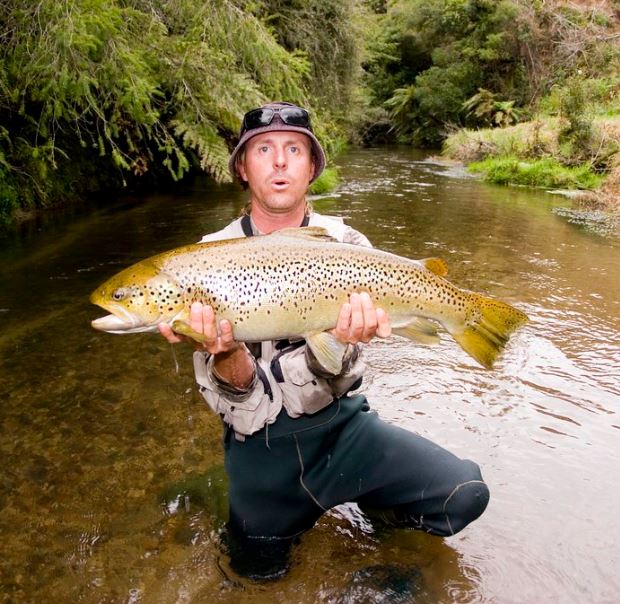Fish type, number and
size |
Both rainbow and brown trout. The Ngongotaha holds a small population of resident fish but is a very important spawning stream with large numbers of fish entering the stream during the cooler winter months to spawn. Many of the fish reach trophy size. |
| Situation |
The Ngongotaha rises in the hills to the west of Lake Rotorua and flows northeast to enter the lake at the small settlement of Ngongotaha. Despite its small size, the Ngongotaha is a very important spawning tributary for both Lake Rotorua and Lake Rotoiti. |
| Maps |
Access map
|
| Check Conditions |
View the Metservice weather forecast.
View the rainfall. |
| Description |
The Ngongotaha Stream is a small river flowing over a shingle and stone bed. The water is generally clear though colours up quickly after rain. Despite its small size, during the winter months trout numbers are very high and anglers can often see many large trout in the pools and moving upstream to the spawning beds.
The section of the river downstream from the Ngongotaha Road Bridge provides superb flyfishing during the winter months. Where the Ngongotaha enters Lake Rotorua there is good fishing at most times of the year. During the winter trout will congregate around the mouth before moving upstream. During the summer the trout will often move close to the in-flowing cooler water where the Ngongotaha enter the lake to escape the summer heat. The river mouth is particularly productive early in the morning and at night especially when there is no moon and it is very dark.
|
| Access |
Downstream from the Ngongotaha Road Bridge, the water is open all year. There is access from the Ngongotaha Road Bridge upstream on both sides of the river and on the true right hand side for that section downstream. Access can also be gained from Western Road, Brookdale and Streamdale Streets and the Paradise Valley Road.
This river flows through much privately owned land and anglers should only access the river where there are signed access points. See the Ngongotaha Stream access map.
|
| Methods |
Flyfishing the Ngongotaha Stream is most effective with a weighted nymph or a wet fly. Despite the size of the river, leaders should be reasonably robust when the spawning
trout are running as many of these will reach double figures and require some stopping if they are not to be broken off. |
| Recommended tackle |
Rods capable of casting a weight to 5-7 line and with reasonably robust terminal leaders (preferably fluorocarbon) of approximately 3 m length. As many fish can be seen easily, the use of a strike indicator is not strictly necessary. |
| Recommended lures |
Nymphs:
During the spawning season each patterns such as a glow bug or a weighted nymph such as a roughly tied Hare and Copper or Halfback.
Dry flies:
While most of the fishing on the Ngongotaha is done during the spawning runs during the winter, there are some resident fish throughout the year. During the summer try cicada patterns or beetle patterns.
Wet flies:
Green Woolly Buggers, Mrs Simpson, Hamill's Killer and Red Setter.
|
| Regulations (1) |
| Applicable to |
Ngongataha Stream below SH5 Bridge |
| Region |
Eastern region regulations |
| Season |
All year |
| Methods |
Artificial fly, spinner |
| Bag limit |
Trout: 8
Brown trout: 2 |
| Size limit (cm) |
350mm minimum |
| Regulations (2) |
| Applicable to |
Ngongataha Stream above SH5 Bridge |
| Region |
Eastern region regulations |
| Season |
1 Dec-30 Jun |
| Methods |
Flyfishing only.
Fishing for trout from an unanchored boat is prohibited. |
| Bag limit |
Trout: 8
Brown trout: 2 |
| Size limit (cm) |
350mm minimum |
| Regulations (3) |
| Applicable to |
Within a 200m radius of the centre of the Ngongataha Stream mouth in Lake Rotorua |
| Region |
Eastern region regulations |
| Season |
All year |
| Methods |
Artificial fly, spinner.
Fishing for trout from an unanchored boat is prohibited |
| Bag limit |
Trout: 8
Brown trout: 2 |
| Size limit (cm) |
350mm minimum |



